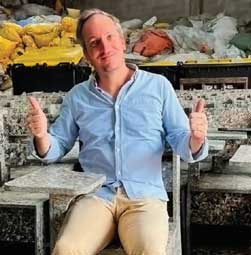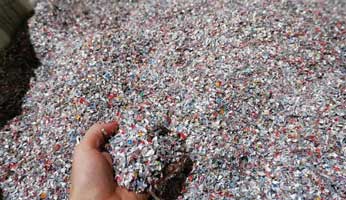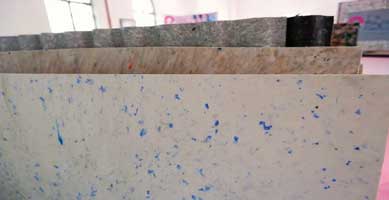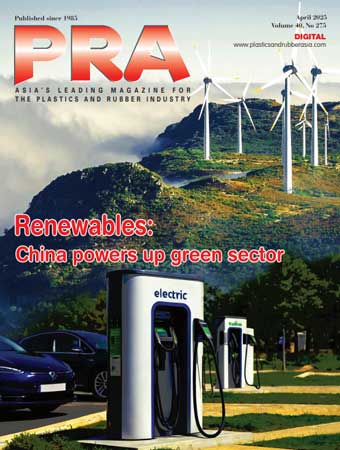Philippines counters waste plastic: pink flamingo to the rescue!
Akin to other Asian countries, Philippines is plotting waste solutions through policies and consumer awareness campaigns. Meanwhile, social enterprises, like the ironically named The Plastic Flamingo ( The PLAF), are rolling up their sleeves, literally, to counter the waste issue and repurpose it sustainably for use in the construction industry. The PLAF, which has a pink flamingo as its logo, was named to evoke an image of fun and add colour to an otherwise “dirty” image associated with recycling
The country’s National Solid Waste Management Commission (NSWMC) has reported that Philippines generates around 40,000 tonnes/day of waste, equivalent to an average of 0.40 kg/person/day across both urban and rural areas.
As such, companies like The PLAF collect and upcycle plastic waste into construction materials such as boards, fencing and decking that can be used to build schools, housing, and shelters.

François Lesage, the founder/CEO of The PLAF, was inspired to set up the company while he was on a cycling tour from France to Cambodia. “My wife and I were confronted with how mass consumerism and the production of plastic has led to enormous plastic waste pollution,” he said.The rest as they say is history.
On why the French couple selected Philippines as the base, Lesage said, “Southeast Asia is among the top contributors to marine plastic pollution, and Philippines, in particular, has been the largest contributor globally for a consecutive number of years.”
However, Lesage’s vision extends beyond the country and he adds the company is in the “initial stages of creating a similar recycling facility in Cambodia”.
Multitude of plastics for recycling into building boards
The Manila-based company, which is part of the Ellen MacArthur Foundation community and the Alliance to End PlasticWaste (AEPW), is able to recycle PS, PVC and HDPE waste at its facility in Muntinlupa.

The waste is sourced from a network of more than 300 collection points that include households, schools, hospitals, local government units (LGUs) and offices, according to Lesage, adding that the company has already managed hundreds of tonnes of plastic waste from collection sites.
“We accept diversions of plastic waste free of cost and recycle them into our eco-products.With a view to expanding our products, we are also constantly exploring ways to diversify our recycling capabilities,” he explained.
The company’s eco-boards are made of 100% recycled plastic waste, as well as difficult-to-recycle single use packaging such as sachets.
“We use a patented formula for mixing the different types of plastic waste that ensures consistently hard and sturdy eco-boards.The boards are low maintenance and long lasting (even outdoors).They are also weatherproof, splinter and termite-free, which means no maintenance over a short period of time.”

He adds that the entire process is undertaken in the country, creating jobs for Filipinos. “Our warehouse workers and waste collectors come from low-income families, providing them with livelihoods where they can upskill and seek more opportunities,” he reiterated.
The company is also able to design and create various made-to-order furniture pieces, partitions and other items from the eco-boards that come in a fixed shape of 115 x 115 cm panels.
“One example is the school chairs that were made from eco-boards, thereby addressing the country’s shortage of school chairs.”
The company also provides rHDPE granules, made 100% from recycled home and personal care HDPE bottles/packaging, which are sorted, crushed and shredded into flakes. “We pack the pellets in 25 kg sacks on pallets. Each pallet contains 50 sacks for a total weight of 1,250 kg,” he added.
Ensuring waste is recycled; pursuing environmental goals
Apart from recycling waste, Lesage says the firm has partnered with organisations for clean-up activities to encourage the engagement of their employees and communities to pursue the recycling goal in the country.
“It is an effective way to involve individuals in the recycling chain as well as expose them to the severity of the plastic waste problem. As of August 2025, from the time we started in 2018, we have managed to divert more than 1.2 million kg of plastic waste from the ocean!”
Meanwhile, he adds that the country is taking significant steps towards mitigating plastic waste as evidenced by the EPR law enacted in 2022, which is the first amendment to the Ecological Solid Waste Management Act.

Through this law, plastic manufacturers, brand owners, importers, and other producers categorised as FMCGs are required to recover, recycle, and manage their plastic waste, in line with the aim for plastic-neutrality in ten years.
The PLAF also provides EPR and CSR services working with key partners such as AEPW, logistics provider CMA CGM, US packaging firm Charter Next Generation (CNG) and consumer healthcare firm Haleon.
“No doubt there is a lot of interest coming from the community to undertake recycling but it is vital to overcome the hesitation from the market when it comes to accepting recycled products, since countering plastic waste will not end with collection and recycling only,” adds Lesage, concluding with an observation that market acceptance is slowly taking off in the country based on the number of enquiries the company is receiving.
(PRA)SUBSCRIBE to Get the Latest Updates from PRA Click Here»










